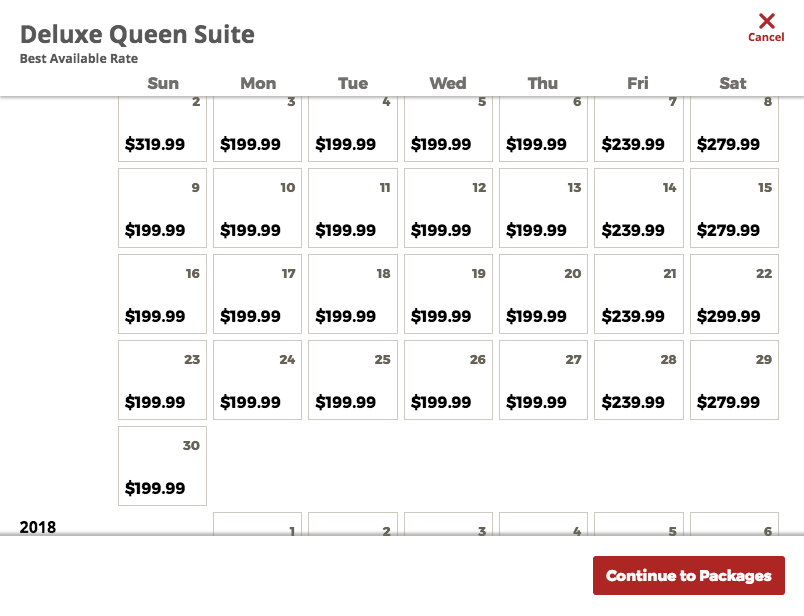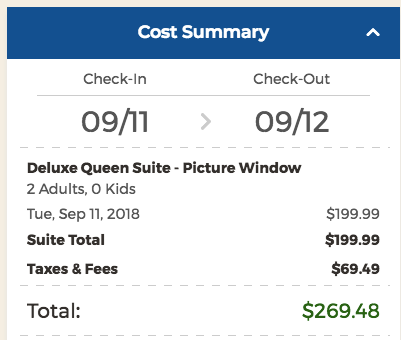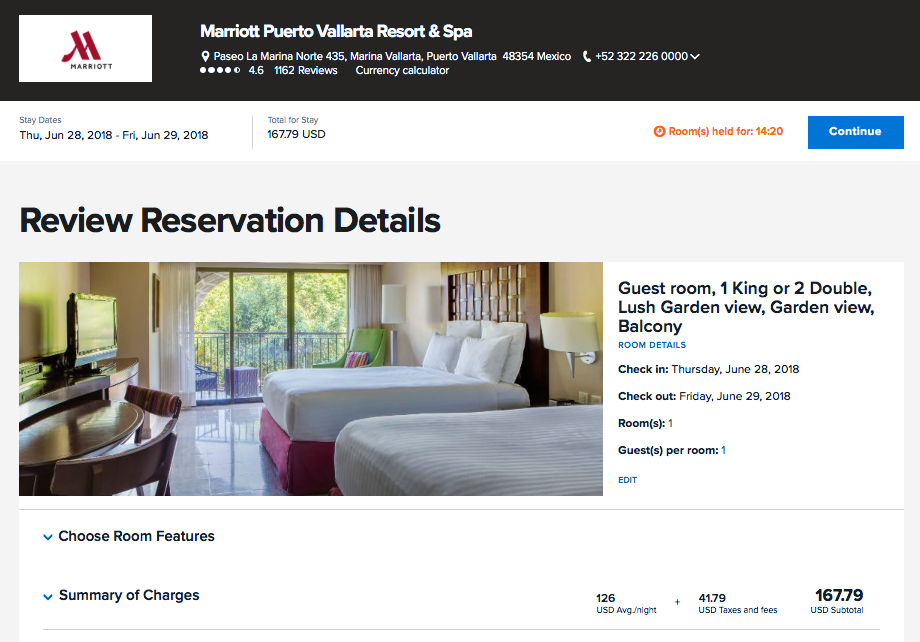The Critical Points: Resort Fees Must Go
Each month in his column "The Critical Points," TPG Senior Points and Miles Contributor Richard Kerr presents his opinion on a loyalty program, card product or recent news that he believes is overlooked, unsung or the result of groupthink taking mass opinion in a direction with which he doesn't agree. His goal is not necessarily to convince you to agree with his position, but rather to induce critical thought for each of the topics and positions he covers.
A resort fee, a/k/a destination fee or urban fee, is a second room rate charged purely to increase a hotel's profit. I call resort fees "second room rates" because they're taxed identically to the advertised room rate. A resort fee is not for pool towels, fitness center access, free local phone calls or for making faxes. A resort fee is not optional and the benefits advertised as being funded by a resort fee cannot be refused.
These fees set a dangerous precedent for both the unbundling of prices for good services, and for allowable deceptive advertising. Resort fees must go.
The Greatest Offender — Great Wolf Lodge
Great Wolf Lodges are family resorts designed around indoor water parks. The company recently opened a new property in my hometown of LaGrange, GA, so I began to investigate what a night away for my wife and two children would cost (and how to cover it with points).
What you'll find when looking for rooms is a rather handy rate calendar allowing you to search through a month to find the best priced nights:

But unfortunately, what you'll find when you get to the checkout screen is a room rate of $199 costs a total of $270 after you include taxes and fees of $69.49:

Notice that in the above screenshot, "taxes and fees" is not hyperlinked. There's no breakout anywhere of what those taxes and fees consist of. It's purposely kept opaque to make the traveler believe the state and municipality has levied mandatory taxes of 35.1% on your reservation.
In reality, the local hotel tax in Lagrange is 15.1% plus a $5 per night state hotel fee. Hidden but not disclosed anywhere on the Great Wolf website — and I mean nowhere — is a $29.99 per night resort fee, which is also taxed at the 15.1% rate. This means a second room rate is tagged onto every night, taxed like a room rate, not disclosed in any way and purposely left as opaque as possible. The good citizens of and visitors to my hometown are duped into paying Great Wolf Lodge an unadvertised additional $30 per night.
I reached out to Great Wolf and asked the following two questions:

- Can you provide a link on the Great Wolf Lodge website where the resort fee is disclosed?
- Does Great Wolf believe this pricing model to be fair and transparent?
I received the following response from the Director of Communications:
"The resort fee is $29.99 and we do list some of the elements included as part of that fee on our FAQ page. A few of the items covered in this fee are wireless internet, self-parking, fitness center access, in-room amenities like bottled water and coffee, along with life jackets and towels for the water park.
As a long-time Marriott guest, I noticed they too take more of a bundled approach when it comes to taxes and fees on their 'summary of charges' page – but that said, we are currently in the process of making some design changes to the payment/confirmation page of our website and are exploring a more detailed breakdown of the charges in the 'Taxes and Fees' section."
I'm not sure what Marriott has to do with anything, but since Great Wolf's Director of Communications brought it up, let's take a look at how Marriott handles resort fees on its website. Here's what the booking screen looks like for the Marriott Puerto Vallarta Resort & Spa, a property that charges a $15 per night resort fee:

As you can see, Marriott does seem to bundle its resort fee together with government taxes. So Great Wolf is just following the leader, right?
Wrong. Because when you click on that "USD Taxes and fees" number, this is what pops up (highlighting in red added):

While it's still an annoying and likely unnecessary resort fee, at least Marriott is disclosing its existence, unlike Great Wolf. In any case, I'm very interested in hearing the results of Great Wolf's "transparency exploration" when it finally concludes, because as of this writing, that $29.99 is still not disclosed anywhere on the Great Wolf website.
This pricing model is specifically designed to take advantage of the typical Great Wolf clientele — those who travel once a year or less — by hiding the resort fee as mandatory taxes. Great Wolf isn't the only travel company guilty of this practice, but as a consumer, there's no way to make an informed decision on how much you're willing to pay Great Wolf Lodge.
The Government's Stance
Perhaps my biggest pet peeve with resort fees is the double standard levied by the federal government on airlines versus hotels. While airlines have been forced to include all taxes and fees in published fares, hotels have been left alone to continue advertising less-than-actual nightly rates.
In 2012, then Secretary of Transportation Ray LaHood enforced a Department of Transportation rule that said airlines and ticket agents must include all mandatory taxes and fees in published airfares, and that baggage fees must be disclosed to consumers buying tickets. Judging by recent airline profits and load factors, enforcement of this rule has not been bad for business.
In the department's statement announcing enforcement of the rule, LaHood said, "Airline passengers have rights, and they should be able to expect fair and reasonable treatment when booking a trip and when they fly. The new passenger protections taking effect this week are a continuation of our effort to help air travelers receive the respect they deserve."
Since a large number of people on every flight are probably headed to a hotel once they disembark, without further action, the government apparently believes the respect we air travelers deserve ends when we step off the plane and onto the jet bridge.
In January of 2017, the Federal Trade Commission (FTC) published a report on the economic analysis of hotel resort fees. The report concludes:
"This analysis finds that separating mandatory resort fees from posted room rates without first disclosing the total price is likely to harm consumers by increasing the search costs and cognitive costs of finding and choosing hotel accommodations. In this situation, a consumer's choice is either to incur higher total search and cognitive costs or to make an incomplete, less informed decision that may result in a more costly room, or both. The analysis finds that separating resort fees from the room rate without first disclosing the total price is unlikely to result in benefits that offset the likely harm to consumers."
Strong words, but once again, the government's words have not led to action. While recognizing that resort fees are bad for consumers, the considerable lobbying power behind massive hotel and casino corporations has so far ensured that this "harmful pricing method" (those are the government's words) has not been stopped.
What Can You Do?

First and foremost, speak with your wallet. Don't patronize properties that charge you a second room rate, and let management know why you're deciding to not stay at their location. Until properties see a difference in their bottom line, no changes will take place.
Second, I find it hard to believe that the DC lobbyists will allow Congress to take federal measures, which means this battle will have to be fought at the state level. File complaints with your own state attorney general, along with the attorney general of the state where the property is located. Explain that these hotels are using unfair and deceptive pricing methods. A quick Google search will lead you to local state business statutes prohibiting such pricing policies.
Also, contact local representatives whose districts survive on your tourism dollars and let them know you're no longer visiting because hotels are charging resort fees. Finally, head over to KillResortFees.com to read everything you'd ever want to know about resort fees, and find out how to take additional action.
Bottom Line
I'm not anti-business. I want hotels to make money (lots of money, actually), but I want prices to be transparent so consumers can make informed decisions. In my mind, this can really be boiled down to one argument: if a hotel is confident in the product it has, it should be able to charge a single unified price, inclusive of any current resort fee, and stand behind that price. Let the market decide if the price is too high. If bookings go down, lower your price or increase the quality of your product.
But if you want a sure-fire strategy to guarantee I'll never visit your property again, insult my intelligence by charging me a second room rate and say it's for fax machine access.
TPG featured card
at Capital One's secure site
Terms & restrictions apply. See rates & fees.
| 5X miles | Earn 5X miles on hotels, vacation rentals and rental cars booked through Capital One Travel |
| 2X miles | Earn unlimited 2X miles on every purchase, every day |
Pros
- Stellar welcome offer of 75,000 miles after spending $4,000 on purchases in the first three months from account opening. Plus, a $250 Capital One Travel credit to use in your first cardholder year upon account opening.
- You'll earn 2 miles per dollar on every purchase, which means you won't have to worry about memorizing bonus categories
- Rewards are versatile and can be redeemed for a statement credit or transferred to Capital One’s transfer partners
Cons
- Highest bonus-earning categories only on travel booked via Capital One Travel
- LIMITED-TIME OFFER: Enjoy $250 to use on Capital One Travel in your first cardholder year, plus earn 75,000 bonus miles once you spend $4,000 on purchases within the first 3 months from account opening - that’s equal to $1,000 in travel
- Earn unlimited 2X miles on every purchase, every day
- Earn 5X miles on hotels, vacation rentals and rental cars booked through Capital One Travel
- Miles won't expire for the life of the account and there's no limit to how many you can earn
- Receive up to a $120 credit for Global Entry or TSA PreCheck®
- Use your miles to get reimbursed for any travel purchase—or redeem by booking a trip through Capital One Travel
- Enjoy a $50 experience credit and other premium benefits with every hotel and vacation rental booked from the Lifestyle Collection
- Transfer your miles to your choice of 15+ travel loyalty programs
- Top rated mobile app


